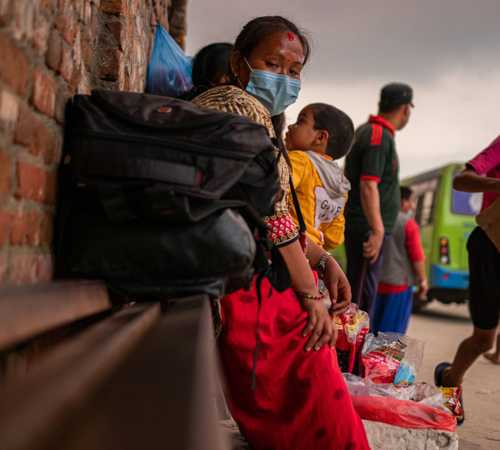
Photo Essays
2 MIN READ

How Durga Jirel’s business has been barely surviving through these uncertain times

For Durga Jirel, the days of 2020 seem to be moving in fits and starts. In the beginning, her days were filled with hope. That was when the 33-year-old mother of two was just starting out as a bus-park hawker, after having quit her earlier job as a domestic help. In those early days as an entrepreneur, she harboured the belief that as long she put in the hours, her business would provide for her and her family. But once Covid-19 crept into Nepal, she’s seen her days get roiled by the whims of fate—a force equal parts shaped by the coronavirus’s impacts and equal parts by the Nepali authorities’ response to the disease’s spread.
Most days, Jirel still adheres to the work schedule she started out with: getting to the bus park (near Ratna Park) with her styrofoam container filled with snacks and other knick knacks at around 5:30 in the morning, and leaving for home around sundown. But within the very first month of the pandemic, she had to learn to deal with very unpredictable daily sales. And then with the first lockdown and subsequent prohibitory orders, she saw her business dry up almost completely.
After the prohibitory orders were lifted, she has been bringing home a little more money. It’s not a lot: she usually makes between NRs 1,200 to 1,800 in gross income daily, but quite a bit of it goes into paying off the wholesalers from whom she buys her noodles, bottled water, khaini, gutkha, biscuits, and masks. Because business has been mostly anaemic, her family—which includes her parents—have had to move from the two-bedroom flat they earlier rented to a one-room one.
Business did pick up a bit as Dashain neared, but she doesn’t know how things will be after the festival season is over. Given how the rest of 2020 has gone, she’s girding herself for anything--from barely tiding over bleak lockdown-days to days when she’ll have no clue what the next 24 hours will bring. The only thing she knows for sure is that she will stay put in Kathmandu this Dashain, instead of going home to Jiri. She can’t pack up and leave because her family members’ wellbeing is inextricably yoked to the surges and dips in her daily income.

Deewash Shrestha Deewash Shrestha is a student of Media Studies and a freelancer He can be reached via email: deewash.shrestha@yahoo.com


Features
10 min read
Disillusioned with current politics, young people are now leading a seemingly futile call for the reestablishment of the monarchy
Features
4 min read
The latest court ruling in the Nirmala Panta case muddies the waters even more
COVID19
Features
10 min read
Several inmates have died by suicide while many others have been hobbled by the depression and anxiety resulting from conditions inside Nepal’s ill-managed quarantine facilities
Features
3 min read
Nepal accepts China’s request to jointly announce the new height of the world’s highest peak while risking being dismissed by the international mountain community
Features
5 min read
Unless Nepali migrant workers are allowed to vote from abroad, we won’t have a truly representative democracy
COVID19
7 min read
Dignified regional cooperation is the need of the hour and self-reliance the major goal
COVID19
Features
2 min read
Even as health workers continue to sacrifice their lives in the line of duty, the government continues to turn a blind eye to their problems
COVID19
News
3 min read
A daily summary of Covid19 related developments that matter